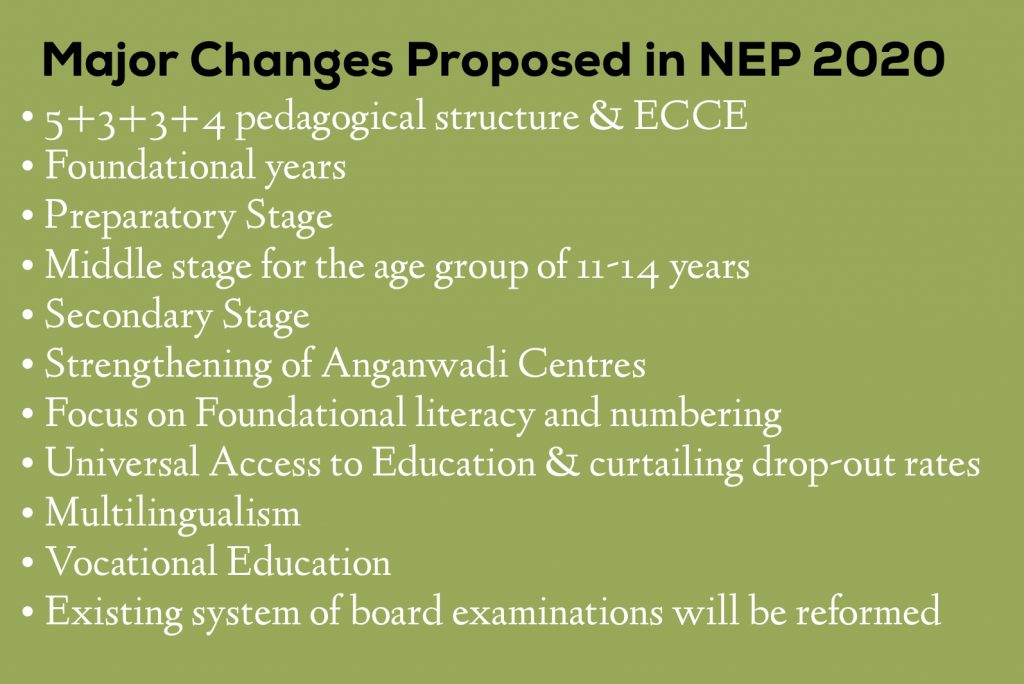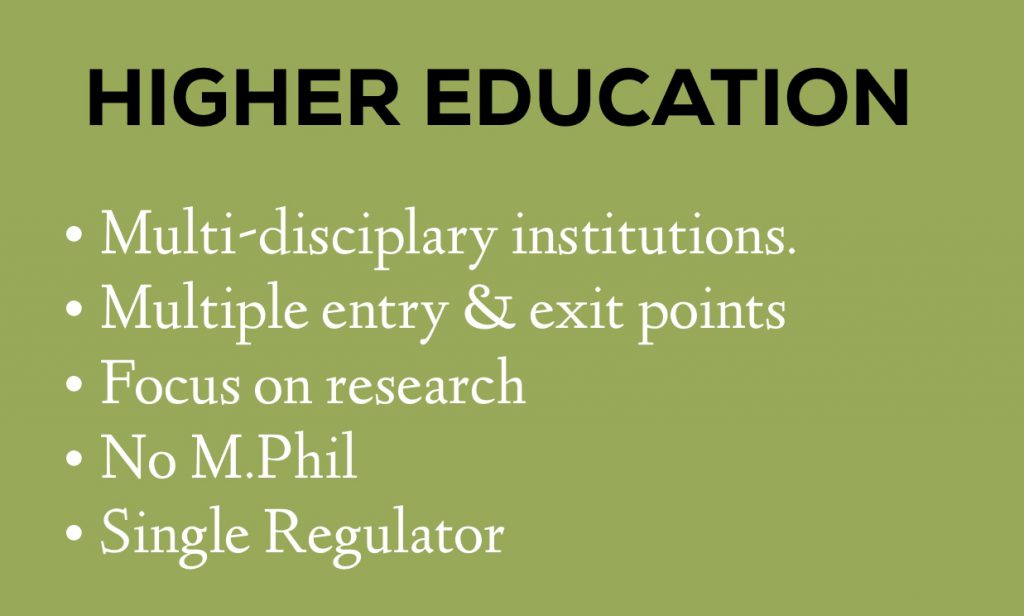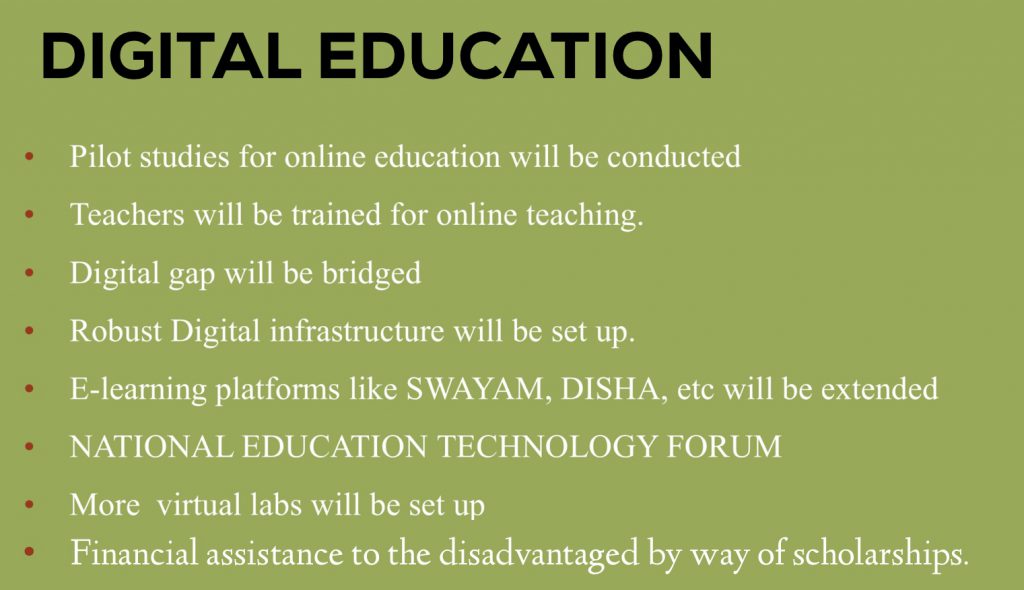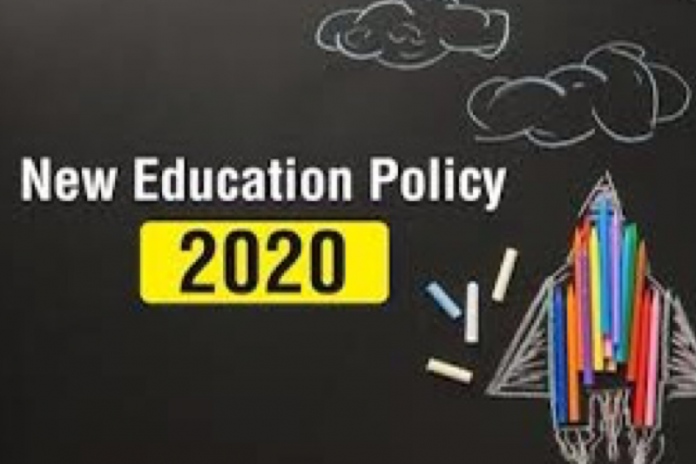Recently, the HRD ministry announced the National Education Policy, 2020. It aims at long overdue reforming of the education system in India – ensuring holistic development of a student. The draft of NEP was submitted to HRD Minister Ramesh Pokhriyal by a panel headed by the former Indian Space Research Organisation (ISRO) Chief K Kasturirangan. NEP 2020 is not a law and is only a policy. It takes into account interests of all the stakeholders and is very comprehensive covering all aspects related to the education sector.
This article aims to simplify the content of NEP 2020 to make it understandable by all.
Is this for the first time that such a policy is introduced in India?
It is for the first time that such a comprehensive education policy is introduced in India, previously, education policies were introduced in the year 1986 and modified in 1992.
The RTE Act was enacted in 2009 to achieve universal elementary education.
What are the major changes proposed by NEP 2020?

NEP 2020 has introduced reforms in school education, higher education institutions, etc. Further, it also provides for proper regulations and implementation of the policy at all levels. Some of the major changes are –
• 5+3+3+4 pedagogical structure & ECCE
The policy envisages modification of the extant 10+2 structure. Instead, it adopts 5+3+3+4 structure with a focus on Early Childhood Care & Education.
The new model takes into account the interests of children. Under it, play schools which are already in existence will come under formal education. There are different stages, namely foundational, preparatory, middle and secondary.
Foundational years
These will consist of 3 years of pre-school/Anganwadi education and 2 years of primary education, including class 1 and 2. Age group from 3-8 will be covered under this. The classes 1 and 2 for students of ages 6 to 8 would also be added, keeping the focus on development of language skills and teaching by play-based and activity-based curriculum.
Preparatory stage
It will be for age group of 8-11 years. The preparatory stage will cover school education from class 3-5 with a focus on experimental learning. It will cover the age group of 8-11 years. The focus would shift to play, discovery and activity-based and interaction classroom learning. The focus till this stage would remain on the development of language and numeracy skills.
Middle stage for the age group of 11-14 years
This will cover school education from class 6-8 and will be for the age group of 11-14 years. This structure aims to transform the pedagogy from the existing system to a more experiential learning in the sciences, mathematics, arts, social sciences and humanities.
Secondary stage
Under it, school education from classes 9-12 in two phases will be covered.
9th to 10th is the first phase and 11th, 12th is the second phase. Under this, students would be able to pick and choose any set of subjects from the available structure. There won’t be any rigid separation of different streams such as Arts, Commerce , Science, etc. For e.g. he can opt for Physics and History.
Strengthening of Anganwadi Centres
The policy proposes to strengthen the Anganwadi centres. These centres will have proper ventilated buildings and Anganwadi workers will be trained.
Focus on Foundational literacy and numbering
It focuses on improving the literacy and learning abilities of students and further calls for setting up a National Mission on Foundational Literacy and Numeracy. All the states will prepare a plan for implementing this for attaining universal foundational literacy and numeracy in all primary schools for all by 2025.
Universal Access to Education & curtailing drop-out rates
The policy envisages access to education to all and curtailment of dropout among the students. Steps will be taken to reduce dropout rates and proper counselling will be provided.
Multilingualism
The policy emphasises the importance of multilingualism-
Teaching up to Grade 5 atleast will be done in mother tongue/ regional language/ local language and preferably till 8th grade and beyond. There won’t be any imposition of language on any student.
Vocational education
NEP takes into account the importance of vocational skills in children. It allows students from Class 6th to take these courses.
Further, NCIVE (National Committee for the Integration of Vocational Education) would be constituted by the Education Ministry.
Lok Vidya i.e. important vocational knowledge developed in India, will be made accessible to
all the students through integration into vocational education courses. Internships will be provided to students.
Existing system of board examinations will be reformed
The extant system of board exams and entrance examinations will be reformed to eliminate the need for taking coaching classes. They will be made easier in the sense that core concepts will be tested and rote learning will be discouraged.
What are the proposed reforms in Higher education?

The policy seeks to reform the higher education system and seeks to end the fragmentation of higher educational institutions and transform them into large multidisciplinary institutions.
Multi-disciplinary institutions
The policy seeks to make higher educational institutions multi-disciplinary. IITs will offer Humanities too.
For holistic and multidisciplinary education, model public universities known as MERUs( Multi-disciplinary Education and Research Universities) will be set up to attain highest global standards in quality education.
Multiple entry and exit points
The undergraduate degree will be either of three year or four year and students will have the option of exit, they will be provided appropriate certificates for that.
Focus on research
Higher Educational Institutions will focus on research by setting up incubation centres. The National Research Foundation will be established to promote a culture of research.
No MPhil course
M.Phil courses will be discontinued.
Single regulator
Under the NEP, there will be a single regulator HECI (Higher Education Commission of India) for all higher education institutions except for legal and medical colleges. NTA will conduct a common entrance exam for admissions to universities and colleges.
What is there for the teachers in the policy?
The policy states that teachers are crucial for the nation’s development. Quality teachers are required in institutions. NEP has focused on teachers, providing them with a proper environment, incentives and learning are important, the policy states.Some of the key changes proposed are-
- Excessive transfers of teachers will be halted.
- Opportunities for self improvement will be given to them. Besides these, incentives will be provided to those who take up teaching in rural areas.
- Training will be provided to improve their skills.
- NPST(National Professional Standards for Teachers) will be developed by 2022
- By 2030, a 4 year integrated B.Ed. degree will be required in order to qualify for teaching. Besides these, 2 year and 1 year B.Ed. degree will also be offered to those who have completed a bachelor’s degree and a masters degree, respectively.
What are the proposed reforms for online learning?

Keeping in view the existing scenario, the policy proposes to encourage online learning by providing a proper digital infrastructure and bridging the extant digital gap.
The policy proposes to set up more virtual labs and equip schools digitally. Besides these, it aims at increasing the access of education for disadvantaged groups and recommends the use of divyang friendly education software.
It also recommends pilot studies for online education and encourages the use of e-learning platforms such as SWAYAM, DIKSHA, etc. Under it, teachers will undergo training to use online platforms which will help them in improving skills and creating content.
It also envisages a blended mode of learning, face to face learning will not be ignored. Proper online assessment mechanisms will be developed.
Further, it proposes to set up a National Education Technology Forum, a platform for exchange of ideas on the use of technology to enhance learning.
Does the policy provide for any support to the differently abled and disadvantaged groups?
Yes, the policy provides for support to the physically challenged and disadvantaged people.
One of the main goals of the policy is to provide education to all and in order to ensure that all gets access to education, it has proposed the following-
- regions with large population of educationally disadvantaged will be declared as Special Education Zones
- Special educators will be recruited.
- Persons with Disabilities shall have the choice of regular or special schooling.
- Finance assistance for students belonging to SC, ST, OBC, etc.
- Creation of a National scholarship portal which will foster and track the progress of students receiving scholarships.
- Private institutions will be encouraged to offer scholarships.
Other important changes proposed by the policy
Academic Bank of Credit (ABC)
It shall be established to store academic credits earned by the students.
MHRD to be renamed
NEP 2020 has proposed to re-designate the Ministry of Human Resource Development (MHRD) as the Ministry of Education (MoE) to bring back focus on education and learning,
Gender inclusion fund
A fund will be created by the appropriate authorities to provide quality education to the girl child.
How is the policy going to be implemented?
- Government will take robust steps to implement this new education policy in letter and spirit with the help of all the state givers, concerned ministries, education departments, regulatory bodies, educational institutions, etc.
- It will be implemented properly by proper planning, cooperation, joint monitoring between the Union and States.
- Both the centre and the states will work in synergy to increase the public investment in education sector to 6% of the overall GDP
- Timely release of funds to all the departments will be done.
- Subject-wise implementation committees of experts will be set up to develop implementation plans.
- Further, joint reviews on a yearly basis will be conducted.
- The Central Advisory Board of Education will be strengthened and empowered and will have a much greater mandate and shall be responsible for developing,articulating, evaluating and revising the vision of education in the nation.
- The whole policy will become fully operational by 2030-40.




















